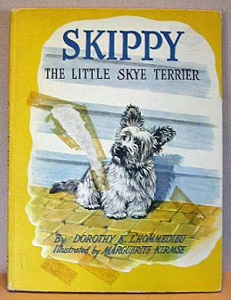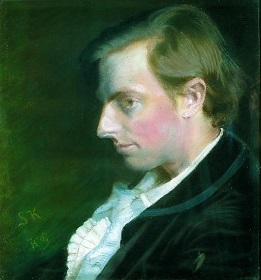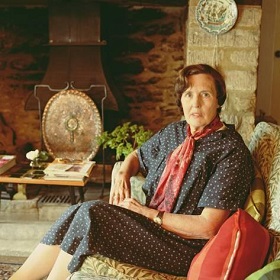De Amerikaanse schrijver Jim Knipfel werd geboren op 2 juni 1965 in Green Bay, Wisconsin. Zie ook alle tags voor Jim Knipfel op dit blog.
Uit: The Blow-off
“Marv was your first husband,” Hank gently corrected. He bit his lip, his eyes drifting involuntarily back toward the ticket booth outside the Girl-to-Gorilla tent.
“I just don’t see the attraction.”
“Fine, I can accept that,” he said. “But would you mind if I went in? You can wait out here, and I’ll be back in ten—”
From inside the tent came the squeal and crash of a metal cage door torn from its hinges and tossed to the ground. Annie jumped a step closer to Hank as, at that instant, the piercing shrieks of half a dozen teenage girls erupted inside. One of the tent’s nylon side panels billowed outward, went taut, and focused nearly to a point before a small, almost delicate black fist punched through the orange fabric. The screams from inside the tent were growing more frenzied. There was a tearing sound as those same girls, blind with panic, ripped their way through the tent wall and poured out onto the midway, stumbling over one another, still screaming and laughing, before scattering in half a dozen different directions. Hank watched a few of them go, shaking his head in quiet, resigned amusement, knowing for certain there was now no way in hell he’d get Annie into the show. “They’re a superstitious people,” he explained. “They always overreact to these things.”
“Shhhh.” His wife glowered at him and pinched his arm for the third time that night. There was nothing playful about it.
Hank winced and pulled his arm away. “All right, then. Let’s move on. We’ll see the gorilla show later. Great show. Trust me. Used to see it when I was a kid.”
She took his arm and they moved down the midway away from the ripped tent, weaving their way through the thick Jersey crowds, trying to avoid
the dropped ice-cream cones and puddles of cotton candy vomit as they went.
The rides they were passing grew more rickety and treacherous with each passing year. Or maybe, Annie sometimes thought, she and Hank were just getting older.”

Jim Knipfel (Green Bay, 2 juni 1965)
De Duitse schrijver en literatuurcriticus Marcel Reich-Ranicki werd geboren op 2 juni 1920 in Włocławek, Polen. Zie ook alle tags voor Marcel Reich-Ranicki op dit blog.
Uit: Meine Geschichte der deutschen Literatur
“Mit dem Herzen hat es eine eigene Bewandtnis. Es ist — sagt der Prophet Jeremias —»das Herz ein trotzig und verzagt Ding; wer kann es ergründen?« Ohne das Herz, weiß jedes Kind, kann niemand existieren. Nur stellt sich meist heraus, dass gerade die herzlosen Menschen lange und gut leben. Man kann sein Herz verschenken: »Ich schenk mein Herz nur dir allein« — singt die Madame Dubarry in Millöckers Operette. Man kann sich auch ein Menschenherz als Geschenk wünschen, ohne deshalb der Grausamkeit bezichtigt zu werden. Aus dem »Notenbüchlein für Anna Magdalena Bach« kennen wir ja das wunderbare Lied, das mit den Worten beginnt: »Willst du dein Herz mir schenken, /so fang es heimlich an …« Bisweilen sind jene Menschen besonders glücklich, die ihr Herz verschenkt oder die es ganz einfach verloren haben, beispielsweise in Heidelberg.
Verwunderlich ist auch, was das Herz alles vermag. Denn es kann schlagen und klopfen, pochen und hämmern, es kann zittern und flattern, aber auch schmachten und jubeln, es kann stillstehen, aber auch aufwachen und erglühen, es kann stocken und versagen, brechen und zerspringen. Das Herz kann sich an sehr verschiedenen Orten befinden, mitunter sogar gleichzeitig. Man kann es auf der Zunge haben, aber es kann einem auch in die Hose rutschen. Es kann einem im Leibe lachen, aber sich auch im Leibe umdrehen. Man kann es auf dem rechten Fleck haben, aber auch stehlen und erobern. Man kann sich ein Herz fassen, aber auch sein Herz an jemanden hängen. Man kann seinem Herzen Luft machen und ihm einen Stoß geben, es kann einem ein Stein vom Herzen fallen. Man kann etwas auf dem Herzen haben und ein Kind unter dem Herzen tragen. Man kann die Zwietracht, zumal die deutsche, mitten ins Herz treffen. Und wes das Herz voll ist — wir wissen es aus der Bibel —, des kann der Mund übergehen. Und da man sich einer Sache mit halbem Herzen zuwenden kann, lässt es sich offenbar auch halbieren. Natürlich kann man aus seinem Herzen eine Mördergrube und, häufiger noch, keine Mördergrube machen. Auch kann man jemanden in sein Herz schließen, ja, dort ist so viel Platz, dass sich sogar ein ganzer Chor ins Herz schließen lässt.“

Marcel Reich-Ranicki (2 juni 1920 – 18 september 2013)
Cover
De Duitse schrijfster Sibylle Berg werd geboren in Weimar op 2 juni 1962. Zie ook alle tags voor Sibylle Berg op dit blog.
Uit: Ein paar Leute suchen das Glück und lachen sich tot (Tom geht weg)
„Die Luft riecht nach Großstadt, morgens um 4. Ein dicker Geruch. Nach schimmelndem Metall und Bäcker. Die Frau liegt oben. Wahrscheinlich weint sie. Wenn ich eine Frau wäre, würde ich auch weinen. Weil das so bequem ist, eine Flucht, die nichts ändert, falls ihr versteht, was ich meine.
Die Frau weint also vermutlich. Ich nicht. Ich weine nicht, ich leide auch nicht. Ich gehe einfach nur nach Hause. Ich werde mir die Frau abduschen. Wieder durch die Bars laufen und suchen. Nach einer neuen Frau. Wenn Weihnachten ist, und ich kann euch sagen, das kommt immer schneller, als man so denkt, werde ich wieder vor diesem Kaufhaus hier stehen. Jetzt sind da irgendwelche Herbstsachen drin. Blöde Plastefrüchte und so. Aber Weihnachten ist da eine Eisenbahn drin, in dem Schaufenster. Die fährt durch verschneite Dörfer. Die Häuschen sind von innen beleuchtet. Ich steh da immer ganz lange. Stell mir Sachen vor, die in diesen Häuschen passieren. Irgendwo wird eine Katze geschlachtet, in den Ofen geschoben, die Därme an den Baum geputzt. In einem anderen Häuschen liegt der Großvater im Bett und ist schon geraume Weile tot. Da sind Fliegen und die Enkel spielen mit dem Opa. Solche Sachen eben, und ich habe dann so einen Haß auf die Kinder. Die stehen neben mir und sehen meine Bahn an. Und die Eltern zwinkern, wenn die Scheißkinder fragen: Krieg ich so eine? Wir werden sehen, sagen die Eltern und zwinkern.
Ich könnt die dann immer in die Schnauze haun. Ich weiß wirklich nicht, warum. Was ich sagen will, ist, irgendwie suche ich nach einer Frau, die Weihnachten mit mir diese Bahn anguckt. Und die mich nichts Blödes fragt. Die vielleicht so einem Kind eine runterhaut. Und die mir dann eine Eisenbahn schenkt. Aber ich habe so eine noch nie gefunden. Ich gehe jetzt heim, dusche. Und dann gehe ich wieder los. Und suche weiter nach der Frau, die mit mir zu diesem Schaufenster geht.”

Sibylle Berg (Weimar, 2 juni 1962)
De Canadese schrijfster Carol Shields werd op 2 juni 1935 in Oak Park, Chicago, geboren als Carol Warner. Zie ook alle tags voor Carol Shields op dit blog.
Uit: The Stone Diaries
„All spring she’s been troubled with indigestion. Often in the morning, and then again at night after her young husband has gone to sleep, she’s risen from her bed and dosed herself with Bishop’s Citrate of Magnesia. When she drinks ordinary milk or sweetened tea or sugary lemonade she swallows it down greedily, but Bishop’s cool chalky potion she pours into a china cup and sips with deep, slow concentration, with dignity. She doesn’t know what to think. One day she’s persuaded her liver’s acting up, and the next day her kidneys—she’s only thirty years old, but kidney trouble can start early in life, especially for a woman of my mother’s unorthodox size. Or perhaps the problem stems from constipation. Mrs. Flett next door has suggested this possibility, recommending rhubarb tablets, or else, speaking confidentially, some woman’s trouble. Excessive loss of blood, she tells Mercy, is the cause of discomfort for many young ladies—has Mercy spoken to Dr. Spears? Dr. Spears is known for his sensitivity to women’s complaints; he has a way of squeezing his eyes shut when he phrases his delicate inquiries, of speaking almost poetically of nature’s cycles and balances, of the tide of fertility or the consolation of fruit salts.
No, Mercy has not approached Dr. Spears, she would never speak to Dr. Spears of such a thing, she would speak to no one, not even her husband—especially not her husband. Her monthly blood has appeared only twice in her life, springing out of the soft cushions of her genital flesh, staining her underclothes with its appalling brightness, and mocking the small decencies and duties that steady her life: her needlework, her housekeeping, her skill with a flat iron, her preserves and pickles and fresh linens and the lamp chimneys she polishes every single morning.
The doses of Citrate of Magnesia help hardly at all. Fruit salts only make her suffering worse. Her abdominal walls have continued to cramp and heave all spring, and she’s wondered at times if her inner membranes might burst with the pressure. Bile rises often in her throat. Her skin itches all over. She experiences scalding attacks of flatulence, especially at night as she lies next to my father, who, out of love, out of delicacy, pretends deep sleep—she can tell from the way he keeps himself curled respectfully to his own side of the bed.“

Carol Shields (2 juni 1935 – 16 juli 2003)
Cover
De Nederlandse sportjournalist en schrijver Jean Nelissen werd geboren in Geleen op 2 juni 1936. Zie ook alle tags voor Jean Nelissen op dit blog.
Uit: De Bijbel van 100 jaar Tour
“We rijden in langzaam tempo door de Midi, Perpignan. Toulouse, Beziers, Albi, Narbonne, Carcasonne. Het is bloedheet De toeristen die hun campings hebben verlaten zijn schaars gekleed. Dan zien ze onze auto. Het vaderland schuift voorbij. En 16 jaar lang horen wij als enige vraag: ‘Hoe doet Joop het? Dan steken we onze duim omhoog en het volk zakt tevreden terug in de wankele campingstoeltjes. Holland en rijn beleving van de Tour de France. In een tunnelrelatie met een timmerman uit Rijpwetering, Joop Zoetemelk. Ik heb in al die jaren zeer vele spandoekjes gezien: ‘Hup Joop’. Mensen, zittend voor hun tent. hebben zich de moeite getroost om in de campingwinkel of in het dorp een doek te kopen en daarop ‘Hup Joop!’ te kalken. Op zich een ontwapenende vorm van nationalisme.
Je zit daar een of meer weken voor zo’n tent, 2000 kilometer van Genemuiden Kwintsheul en Slagharen verwijderd ren over twee dagen komt Joop voorbij.
De enige opwinding in een weliswaar ontspannend maar soms ook slopend saai bestaan. ‘Hup Joop!” Ik heb hem wel eens gevraagd “Zie je die spandoeken? Joop antwoordt ‘Ja, af en toe.’
Ik ken Joop tamelijk goed. Ik heb tien jaar zijn column voor de kranten geschreven. Dat ging zo. Raam van de auto open. “Joop. nog iets bijzonders?’ Hij antwoordt ‘Nee.’ Ik vraag hem naar enkele details over wat er die dag gebeurd is. Dan sluit ik het raam van de auto en begin aan de column. want ik weet met een afwijkingspercentage van slechts enkele percenten hoe Joop over de gang van zaken denkt. We maken samen ook een commercial voor TopDrop. En wij rijden op 8 juni 1971 de destijds befaamde koppeltijdrit bij De Gouden Karper in Hummelo. Topsporters zoals Ard Schenk en Sjaak Swart en journaltsten worden gekoppeld aan een wielrenner. Het bochtige parcours voert 8.5 km om smalle wegen.”

Jean Nelissen (2 juni 1936 – 1 september 2010)
De Engels romanschrijver en dichter Thomas Hardy werd op 2 juni 1840 geboren in Higher Bockhampton, bij Dorchester. Zie ook alle tags voor Thomas Hardy op dit blog
Uit: Far from the Madding Crowd
“The field he was in this morning sloped to a ridge called Norcombe Hill. Through a spur of this hill ran the highway between Emminster and Chalk-Newton. Casually glancing over the hedge, Oak saw coming down the incline before him an ornamental spring waggon, painted yellow and gaily marked, drawn by two horses, a waggoner walking alongside bearing a whip perpendicularly. The waggon was laden with household goods and window plants, and on the apex of the whole sat a woman, young and attractive. Gabriel had not beheld the sight for more than half a minute, when the vehicle was brought to a standstill just beneath his eyes.
“The tailboard of the waggon is gone, Miss,” said the waggoner.
“Then I heard it fall,” said the girl, in a soft, though not particularly low voice. “I heard a noise I could not account for when we were coming up the hill.”
“I’ll run back.”
“Do,” she answered.
The sensible horses stood — perfectly still, and the waggoner’s steps sank fainter and fainter in the distance.
The girl on the summit of the load sat motionless, surrounded by tables and chairs with their legs upwards, backed by an oak settle, and ornamented in front by pots of geraniums, myrtles, and cactuses, together with a caged canary — all probably from the windows of the house just vacated. There was also a cat in a willow basket, from the partly-opened lid of which she gazed with half-closed eyes, and affectionately-surveyed the small birds around.
The handsome girl waited for some time idly in her place, and the only sound heard in the stillness was the hopping of the canary up and down the perches of its prison. Then she looked attentively downwards. It was not at the bird, nor at the cat; it was at an oblong package tied in paper, and lying between them. She turned her head to learn if the waggoner were coming. He was not yet in sight; and her eyes crept back to the package, her thoughts seeming to run upon what was inside it. At length she drew the article into her lap, and untied the paper covering; a small swing looking-glass was disclosed, in which she proceeded to survey herself attentively. She parted her lips and smiled.
It was a fine morning, and the sun lighted up to a scarlet glow the crimson jacket she wore, and painted a soft lustre upon her bright face and dark hair. The myrtles, geraniums, and cactuses packed around her were fresh and green, and at such a leafless season they invested the whole concern of horses, waggon, furniture, and girl with a peculiar vernal charm.“

Thomas Hardy (2 juni 1840 – 11 januari 1928)
Portret door Walter William Ouless, 1922
Zie voor nog meer schrijvers van de 2e juni ook mijn vorige blog van vandaag.





